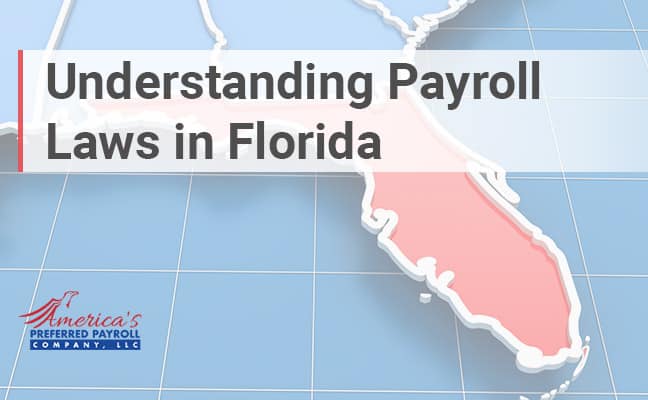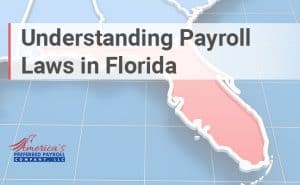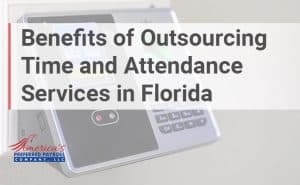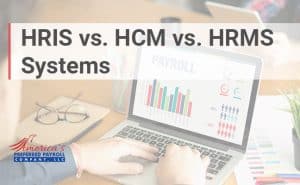It is often said that the United States consists of 50 unique legal jurisdictions divided by state lines. The laws and regulations in one state have the potential to be essentially different from those in another state. In particular, payroll laws differ by state.
This is your inside look at Florida’s unique payroll laws.
Florida’s Minimum Wage
The federal minimum wage is $7.25 per hour. Florida’s minimum wage is significantly higher at $12 per hour. The Sunshine State transitioned to the new minimum wage on September 30, 2023.
Florida employers and employees should be aware that the state’s minimum wage will increase to $15 per hour by 2026.
Florida Laws Pertaining to Tips
Florida business owners, managers and human resources professionals should also be aware that state law requires that an updated minimum wage poster be displayed in an area of the business that all employees can see. There is even a penalty of $1,000 per violation for intentionally refusing to pay the state’s new minimum wage.
Statewide hospitality business owners and managers should be aware that the state’s tipped minimum wage differs from its minimum wage. Service industry employees, such as those who work in restaurants, are eligible for tips. The state’s tipped minimum wage is $7.98 per hour.
Florida employers are legally empowered to take $3.02 per hour of tip credits. Translated from bureaucratic legalese, this means statewide employers are empowered to pay those who earn tips slightly more than $3 less than the minimum wage. However, the caveat is that hourly earnings with tips added must be a minimum of $11.
Florida employment law also allows for the pooling of tips, be it mandatory or voluntary. The law states there is the potential to require that employees combine their tips for distribution across the entirety of the work crew. However, Florida employers that require tip pooling are legally required to provide advanced notice of the policy to all new hires and current employees.
Statewide employers are barred from forcing employees to combine individual tips into a shared pool if such sharing results in hourly compensation that is less than the aforementioned minimum wage. Moreover, Florida employment law states pool tips cannot be shared with employees who are not eligible for tips. As an example, those who work as restaurant managers are not eligible for a cut of pooled tips earned by waitstaff, cooks, bussers, etc.
Overtime Pay
Florida does not have laws on the books addressing overtime compensation. However, the nationwide overtime law is applicable in Florida. Employees considered to be “non-exempt,” as defined by the FLSA are legally entitled to overtime compensation.
FLSA is an acronym used to refer to the Fair Labor Standards Act. Non-exempt are those legally entitled to earn the federal minimum wage and also qualify for overtime compensation. Federal employment law states overtime pay is 1.5x that of the hourly rate for every hour worked in excess of the 40-hour workweek.
Though Florida employment laws do not specify an overtime limit per day, those who work manual labor for more than 10 hours in a day are legally entitled to overtime compensation for time worked beyond the 10-hour mark.
Employee Breaks
Florida employers are not legally mandated to provide employees with a rest break or meal. However, there is a caveat to this law in that workers under the age of 18 are legally entitled to a half-hour break if they work for more than four straight hours.
Scheduling and Reporting
Florida does not have laws on the books that cover the details of reporting hours worked. As an example, if an employee shows up to work yet is released from the shift before it is scheduled to end, the business is required to pay that individual for only the hours worked. State law does not define the minimum length of time an employee is to be paid for showing up for a shift yet not completing the entirety of the shift.
It is also interesting to note that Florida does not have predictive scheduling laws. Nor does the state have advanced requirements for schedule alterations. Florida employers are empowered to alter employee schedules without advanced notice. There is no legal requirement to obtain employee consent for schedule changes. However, such consent might be necessary if the terms of an employment contract or collective bargaining agreement state otherwise.
America’s Preferred Payroll is Here for Your Business
Are you a business owner or manager? If so, consider the merits of outsourcing your payroll, benefits administration, compliance, and time/attendance to our professionals. We help businesses maximize efficiency and the bottom line.
Call us today at (813) 865-4205 to learn more about how we can help your business.













